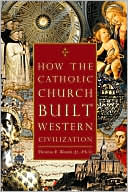A long but worthwhile read on the vision and wisdom of the papap encyclical Humanae Vitae. Not being a Catholic the teachings of this document against contraception are difficult but thought provoking and shoudl at least give Christians of any "flavor" a moments pause in prayerful meditation. The warnings of the document give added weight to it's teachings. It is my understanding that the Eastern Orthodox are a bit more flexible in their teachings. Either position is preferable to the cavlier and (pardon) "devil may care" attitude of most Protestants.
An excerpt from First Things:
...Let’s begin by meditating upon what might be called the first of the secular ironies now evident: Humanae Vitae’s specific predictions about what the world would look like if artificial contraception became widespread. The encyclical warned of four resulting trends: a general lowering of moral standards throughout society; a rise in infidelity; a lessening of respect for women by men; and the coercive use of reproductive technologies by governments.
In the years since Humanae Vitae’s appearance, numerous distinguished Catholic thinkers have argued, using a variety of evidence, that each of these predictions has been borne out by the social facts. One thinks, for example, of Monsignor George A. Kelly in his 1978 “Bitter Pill the Catholic Community Swallowed” and of the many contributions of Janet E. Smith, including Humanae Vitae: A Generation Later and the edited volume Why Humanae Vitae Was Right: A Reader.
And therein lies an irony within an irony. Although it is largely Catholic thinkers who have connected the latest empirical evidence to the defense of Humanae Vitae’s predictions, during those same forty years most of the experts actually producing the empirical evidence have been social scientists operating in the secular realm. As sociologist W. Bradford Wilcox emphasized in a 2005 essay: “The leading scholars who have tackled these topics are not Christians, and most of them are not political or social conservatives. They are, rather, honest social scientists willing to follow the data wherever it may lead.”
Consider, as Wilcox does, the Nobel Prize-winning economist George Akerlof. In a well-known 1996 article in the Quarterly Journal of Economics, Akerlof explained in the language of modern economics why the sexual revolution—contrary to common prediction, especially prediction by those in and out of the Church who wanted the teaching on birth control changed—had led to an increase in both illegitimacy and abortion. In another work published in the Economic Journal ten years ago, he traced the empirical connections between the decrease in marriage and married fatherhood for men—both clear consequences of the contraceptive revolution—and the simultaneous increase in behaviors to which single men appear more prone: substance abuse, incarceration, and arrests, to name just three.
Along the way, Akerlof found a strong connection between the diminishment of marriage on the one hand and the rise in poverty and social pathology on the other. He explained his findings in nontechnical terms in Slate magazine: “Although doubt will always remain about what causes a change in social custom, the technology-shock theory does fit the facts. The new reproductive technology was adopted quickly, and on a massive scale. Marital and fertility patterns changed with similar drama, at about the same time.” ...(more)
...Let’s begin by meditating upon what might be called the first of the secular ironies now evident: Humanae Vitae’s specific predictions about what the world would look like if artificial contraception became widespread. The encyclical warned of four resulting trends: a general lowering of moral standards throughout society; a rise in infidelity; a lessening of respect for women by men; and the coercive use of reproductive technologies by governments.
In the years since Humanae Vitae’s appearance, numerous distinguished Catholic thinkers have argued, using a variety of evidence, that each of these predictions has been borne out by the social facts. One thinks, for example, of Monsignor George A. Kelly in his 1978 “Bitter Pill the Catholic Community Swallowed” and of the many contributions of Janet E. Smith, including Humanae Vitae: A Generation Later and the edited volume Why Humanae Vitae Was Right: A Reader.
And therein lies an irony within an irony. Although it is largely Catholic thinkers who have connected the latest empirical evidence to the defense of Humanae Vitae’s predictions, during those same forty years most of the experts actually producing the empirical evidence have been social scientists operating in the secular realm. As sociologist W. Bradford Wilcox emphasized in a 2005 essay: “The leading scholars who have tackled these topics are not Christians, and most of them are not political or social conservatives. They are, rather, honest social scientists willing to follow the data wherever it may lead.”
Consider, as Wilcox does, the Nobel Prize-winning economist George Akerlof. In a well-known 1996 article in the Quarterly Journal of Economics, Akerlof explained in the language of modern economics why the sexual revolution—contrary to common prediction, especially prediction by those in and out of the Church who wanted the teaching on birth control changed—had led to an increase in both illegitimacy and abortion. In another work published in the Economic Journal ten years ago, he traced the empirical connections between the decrease in marriage and married fatherhood for men—both clear consequences of the contraceptive revolution—and the simultaneous increase in behaviors to which single men appear more prone: substance abuse, incarceration, and arrests, to name just three.
Along the way, Akerlof found a strong connection between the diminishment of marriage on the one hand and the rise in poverty and social pathology on the other. He explained his findings in nontechnical terms in Slate magazine: “Although doubt will always remain about what causes a change in social custom, the technology-shock theory does fit the facts. The new reproductive technology was adopted quickly, and on a massive scale. Marital and fertility patterns changed with similar drama, at about the same time.” ...(more)


No comments:
Post a Comment